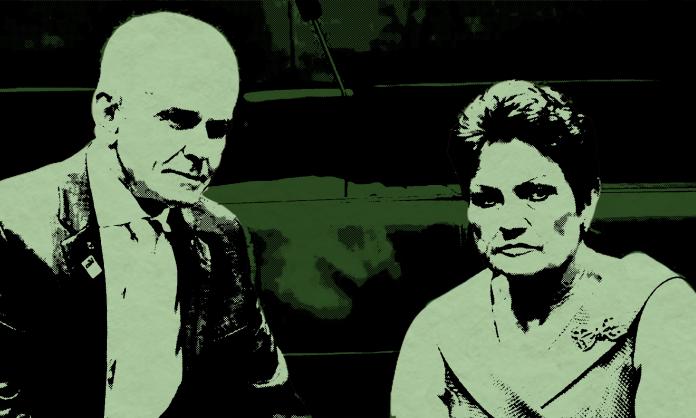Pauline Hanson is a dangerous, racist bigot. She is no friend of workers or our unions. Her party’s vote to defeat the federal government’s vicious anti-union “ensuring integrity” bill is a cynical attempt to shore up some working class votes. That Australia’s unions have relied on this bigot and her allies to save us from an existential threat speaks volumes about just how bankrupt the strategy guiding our movement is – and how urgently we need a change of direction.
The anti-working class agenda of Pauline Hanson’s One Nation is no secret. The party’s parliamentarians have repeatedly voted in favour of tax cuts for the rich. Hanson has flip flopped on unpopular cuts to penalty rates, but in 2014 she argued they should be abolished “right across the board”. In 2017, she celebrated penalty rate cuts in the hospitality sector. Her party has consistently supported strengthening the Australian Building and Construction Commission, the anti union taskforce in the construction industry.
This is before we even get to her attacks on migrants, Muslims, women and other oppressed groups. For two decades, Hanson and her allies have been peddling the divide and rule and scapegoating tactics that our rulers have long relied on to keep our anger focused on our fellow workers and the oppressed, not the rich and their lackeys in politics.
Even a single word of praise for Hanson in the wake of the vote normalises and strengthens vicious racism in this country.
Which is one reason I just can’t get in on all this whooping about the very narrow defeat of the “ensuring integrity” bill. Of course, I’m glad the government lost. Like most unionists, I breathed a sigh of relief that unions and workers won’t be subject to such draconian measures. But we also need to take stock: such a narrow win – courtesy of right wing scumbags – is tenuous at best.
We can’t know exactly what motivated the right wing senators to vote the way they did. It could be that the recent revelations about large scale criminality at Westpac, one of Australia’s big four banks, added to the pressure. Hanson certainly cited this as a factor and the far right’s playbook has long involved whipping up hostility to the banks and big businesses as well as the poor and marginalised. This is part of their appeal and helps explain why, when there’s no credible left wing alternative on offer, workers and the poor can look to fascists and other far right figures when they become fed up with the betrayals of mainstream politicians. This is an increasing and worrying trend internationally, which is all the more reason why unions should not be bolstering these sort of figures.
It is also short sighted – presumably if the government brings an anti-union bill to the parliament in a week when a major corporation isn’t in the headlines for 23 million breaches of the law, Hanson will be happy to vote for it. There is certainly no principle at stake for Hanson, she has indicated that a bill targeting militant unions such as the construction unions would be amenable to her.
Hanson’s vote could also be in part due to pressure from organised workers, and lobbying from union officials. Insofar as this is the case, the union leadership, in particular the peak body ACTU, is congratulating itself. But it matters how we win.
I’m proud to be a worker, proud to be a revolutionary socialist and proud to be playing my role rebuilding union strength and radicalism alongside many other unionists. But when I see ACTU leaders patting themselves on the back and declaring a victory thanks to Hanson, I don’t feel pride. There’s nothing mighty about a union movement that goes desperately begging to racists to save our skins! It’s humiliating. I’m not proud that rather than mobilise workers on the streets, or organise in our workplaces the union movement turns to right wing politicians.
Disastrously, all the ACTU’s eggs are in the parliamentary basket. Whether they’re wasting money and resources on a failed elect Labor campaign, or asking us to tweet far right senators, there simply is no plan B. Which is scary because this will not be the last attack, and our movement – with union membership at 11 percent, strike rates at historic lows, wages stagnant and safety declining in many industries – is perilously weak.
If passed, the “ensuring integrity” bill would have been a big step towards a union movement that exists only at the beck and call of the government of the day. Crippling fines, rapid-fire deregistration for unions, and (perhaps most tellingly) provision for government agencies to appoint administrators to a union able to exercise any power – including calling off strikes, selling assets, sacking organisers and running meetings. All of this is reminiscent of the sort of unions that dictatorships dream of.
Previous generations of unionists have fought on pickets, endured the sacrifices of long strikes and have gone to prison in order to build the union movement into an independent fighting force for the working class. By contrast, our current crop of union leaders responds to an existential threat with nothing more than a campaign of mild lobbying. We barely scraped through this time. And we’ve done nothing to show the sort of fight that would scare our enemies off coming after us again.
It is 50 years since the illegal national general strike that freed jailed unionist Clarrie O’Shea, but it feels like a different epoch entirely. The strike was organised by a conscious left in the union movement, made up of communists and socialists of various stripes, and was set against a radicalised global political climate. The laws that led to O’Shea’s jailing remained on the books, but bosses and governments were too terrified to use them for decades after the strike. Most importantly, the strike reinforced workers’ confidence and gave them a sense of their own enormous power.
The 1969 victory opened the floodgates. By 1971, 30 percent of workers were involved in strike action. Strikes levels peaked in 1974, as did the rate of unionisation two years later, at a record 56 percent. In the midst of this strike wave the share of wages as a percentage of the GDP rose to its highest level ever. Conditions like four weeks annual leave, workers’ compensation and the principle of equal pay for women were won.
If we are to make our work places safe, win dignity at work and lift our stagnating wages – not to mention bring about the social and environmental reforms that are so desperately needed – we need unions that look to the collective self activity of workers as they did in 1969, not to false friends in parliament.









